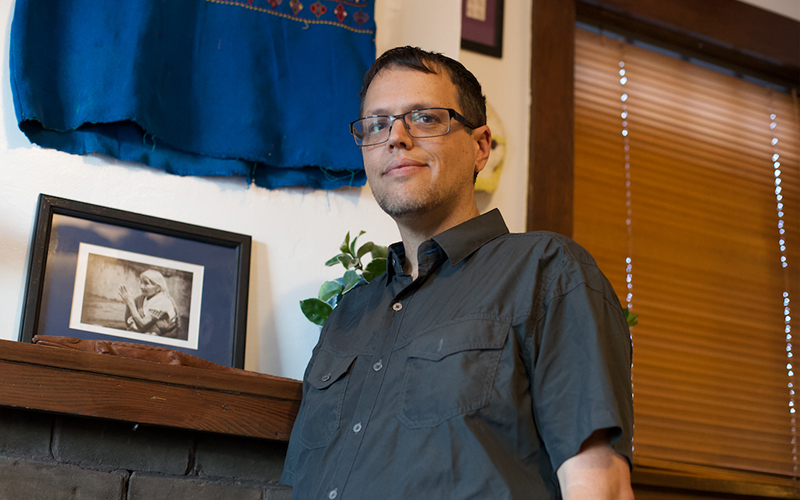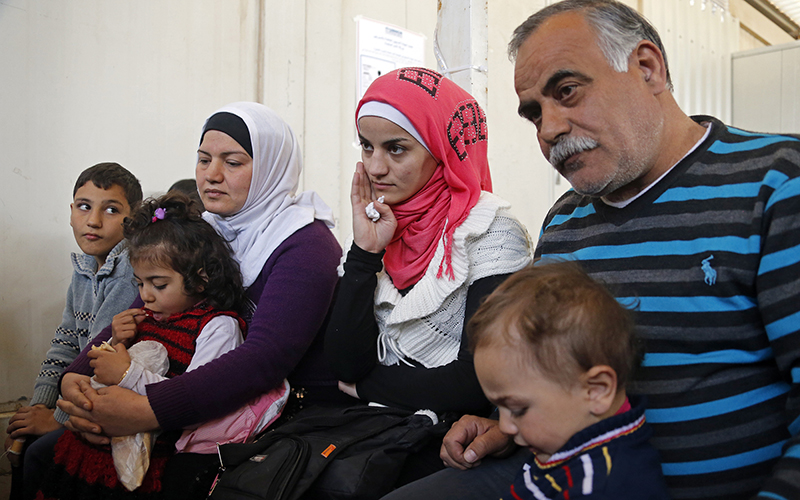
Jason Odhner, a nurse in Phoenix, is the president of the Phoenix Alliance for Community Health and has been a health justice advocate since 2008. (Photo by Madeline Ackley/Cronkite News)
PHOENIX – The Trump administration has reversed course in its decision to end a process allowing medically vulnerable migrants to apply through U.S. Citizenship and Immigration Services for a stay of deportation.
In a memo dated Sept. 19, the Department of Homeland Security, which oversees Citizenship and Immigration Services, alerted Congress that “… at the direction of Acting Secretary McAleenan, USCIS is resuming its consideration of non-military deferred action requests on a discretionary, case-by-case basis, except as otherwise required by an applicable statute, regulation, or court order.”
Citizenship and Immigration Services has processed what’s called “deferred medical action” since the agency’s founding in 2003. Applicants are noncitizen, undocumented immigrants who otherwise could be in danger of deportation.
But in August, applicants began receiving denial letters from the agency stating that it no longer processes non-military medical deferred action requests, and that applicants have 33 days to leave the country or face potential deportation.
Denial letters were sent to 424 people, the agency said. Although USCIS does not keep an official count, an estimated 1,000 immigrants apply each year. Fewer than half are granted deferral status.
The move was widely denounced by medical professionals, humanitarian organizations and more than 100 lawmakers. After pressure, Citizenship and Immigration Services announced it would reassess applications submitted before Aug. 7.
Now, the process apparently has been fully reinstated.
Before the reversal, officials at Citizenship and Immigration Services announced that those seeking deferred action for medical and other humanitarian reasons would need to refer to Immigration and Customs Enforcement.
Sick migrants and deportation
Jason Odhner, a Phoenix nurse and health justice advocate, said medically fragile migrants facing deportation isn’t rare, and it’s certainly nothing new.
Odhner is the president of Phoenix Allies for Community Health, a clinic that provides free medical care to marginalized populations, including undocumented immigrants, although Odhner clarified that his comments are his personal opinions and not necessarily the official stance of organization.
“I’ve seen people in deportation proceedings who need lifesaving care,” Odhner said.
Phoenix immigration attorney Jonathan Solorzano has seen firsthand what can happen to sick migrants when their deferred action petition through Citizenship and Immigration Services is denied and they’re referred to ICE.
Solorzano said he represented a client with a severe heart condition who “could barely walk,” following multiple heart surgeries. Although the man initially cooperated with USCIS to remain in the country, at some point the agency denied his application to stay and his case was remanded to ICE.
For about a year, Solorzano said, his client was allowed to remain in the country, but when he went to reapply with ICE, his request was denied.
“He had a letter from his cardiologist saying, ‘If this guy goes to Mexico, he’s going to die,'” Solorzano said. His client eventually was deported, and he died weeks later.
Solorzano recently represented another undocumented woman named Alma Beltrán, who came to the U.S. from Mexico and gave birth to sick twins in Arizona. While her infants were hospitalized, Beltrán was deported to Mexico. One of the babies died while Beltrán was out of the country, Solorzano said.
Eventually, Beltrán was allowed to return to the U.S. on a conditional humanitarian visa, and was reunited with her surviving child. They have since returned to Mexico.
“Definitely in the last year or two in this … administration, they have become more strict and less compassionate,” Solorzano said of Trump immigration policies. In the past, immigration enforcement agencies would “turn a blind eye” on the medically vulnerable, instead focusing their resources on targeting bigger fish, such as violent offenders.
“Now, they don’t think twice to enforce deportation orders,” he added.
“These are people that are really, really sick … and they’re getting no help from the government,” Solorzano said.
Activists and advocates celebrate policy reversal
Solorzano applauded the reinstatement of the program through Citizenship and Immigration Services.
“My only comment on that is that I am glad to see social pressure on government institutions is still an effective tool,” he said.
U.S. Rep. Raul Grijalva, D-Tucson, who has opposed ending the medical deferred action program, addressed the policy reversal in a Sept. 20 tweet.
“Thanks to the individuals who spoke out against this horrific policy by the Trump Administration that would have effectively condemned immigrants with life-threatening medical conditions to death,” Grijalva tweeted. “Trump has nothing but cruelty for our most vulnerable.”
Thanks to the individuals who spoke out against this horrific policy by the Trump Administration that would have effectively condemned immigrants with life-threatening medical conditions to death.
Trump has nothing but cruelty for our most vulnerable. https://t.co/nr0pYuw2EZ
— Raul M. Grijalva (@RepRaulGrijalva) September 20, 2019
Month of confusion for sick migrants
Deferred action through Citizenship and Immigration Services allows medically fragile undocumented migrants to petition to temporarily avoid deportation of themselves and their families while they undergo life-saving medical treatment in the U.S.
But in the past month and a half, that system was cast into uncertainty after Citizenship and Immigration Services announced that ICE would be handling all future requests to defer deportation for humanitarian reasons.
According to ICE, however, the agency was not immediately aware of the change.
“ICE is not going to implement any sort of a program or procedure or policy to take over that function,” an ICE official told Boston’s WBUR in August. “We’d like USCIS to clarify what they mean, and we’re working collaboratively to get them to be a little more forthcoming about it.”
At the time, concerns were raised about the implications of medical deferred action requests being processed through ICE.
The internal immigration enforcement agency has an appeals process to delay deportation, but to appeal for any reason, an applicant must already be in deportation proceedings.
If a sick migrant is granted a temporary hold on deportation proceedings, they may only stay for a maximum of one year before they must reapply, and ICE does not grant work authorization for relatives, in contrast to the long standing program under Citizenship and Immigration Services.
The House Committee on Oversight and Reform held a hearing on Sept. 11 in an attempt to clarify the situation.
The committee called stakeholders to speak, including sick migrants with medical deferred action as well as doctors who treat sick migrants and lawyers representing the patients, including Anthony Marino, director of the Irish International Immigrant Center in Boston.
Marino said at least 424 families across the country had received rejection letters starting in August from USCIS, including several of his clients. Citizenship and Immigration Services estimates that 1,000 migrants per year apply for medical deferred action; most petitions are not approved, according to the agency.
Medical professionals also weighed in at the subcommittee hearing on what deportation could mean for migrants receiving treatment in the U.S.
“It is sadly not hyperbole to say that sending medically fragile children to (their home countries) amounts to issuing them a death sentence,” said Dr. Fiona Danaher, a pediatrician at Massachusetts General Hospital. “This is not just bad medicine, it is unconscionably inhumane.”
Former director of ICE, Thomas Homan, who was also invited to the hearing, pushed back against immigration advocates and congressional Democrats, saying, “There is a crisis on the border … and it’s not going to go away if we … want to give away college education and driver’s licenses and free medical care and reward illegal behavior.”
Homan defended Citizenship and Immigration Services’ decision to end the program, calling medical deferred action “another enticement” for migrants to make the dangerous journey to the U.S.-Mexico border.
Daniel Renaud, associate director of Citizenship and Immigration Services, and Timothy Robbins, acting executive associate director of ICE, also appeared before the subcommittee.
Neither would answer the majority of questions regarding the program changes, citing legal counsel. They would not say who specifically told them not to answer questions.
“All cases denied on Aug. 7, 2019, are being reopened and reconsidered,” Renaud said.
An internal memo obtained by Politico reveals that Citizenship and Immigration Services officials were privately in favor of ending deferred action for humanitarian reasons altogether.
Kathy Nuebel Kovarik, USCIS’ policy and strategy chief, said she believes the program is “subject to abuse,” and “runs counter to the president’s agenda to enforce our existing laws and potentially contrary to his goal of making sure aliens are self-sufficient,” according to the internal memo.
Stories of sick migrants make news
After news broke in mid-August about the program’s changes, stories of migrants who came to the U.S. seeking medical treatment unavailable in their home countries came to light.
Maria Bueso, 24, who attended the Sept. 11 subcommittee hearing, was invited to the U.S. from Guatemala when she was 7 to participate in a clinical study of her rare disorder.
Since then, Bueso has cooperated with Citizenship and Immigration Services and her application has always been approved, until she received a denial letter on Aug. 13.
“I’ve been here legally for 16 years. And this is the first time that this has happened to me and my family,” she told the subcommittee.
Bueso recounts crying and shaking after receiving the letter last month informing her that she must leave the country, despite her condition.
Policy changes intentionally confusing, advocate said
Jason Odhner of PACH said he was relieved the administration ultimately reversed course in this case.
“I’m glad that they finally withdrew the reckless decision,” he said. “This kind of erratic back-and-forth, ambiguous policy-making is fundamentally not normal and sows seeds of confusion in the communities.”
He added that though the policy was reversed, the confusion might have lasting consequences. “It does damage when they behave erratically like this,” he said.
In the past year, the Trump administration has enacted a number of policies that have drawn widespread criticism from immigrant rights advocates, including the child separation policy at the border, conditions in migrant detention centers, and most recently, the “public charge” rule. It makes the use of public benefits by immigrants a potential liability when the time comes to process their green card. The public charge policy is set to take effect on Oct. 15.
Odhner, of Phoenix Allies for Community Health, said he was not surprised when he heard the news that medical deferred action cases would be remanded to ICE. He considers the move a small part in a larger strategy to sow fear and uncertainty within migrant communities, ultimately forcing them to leave.
Odhner said the mindset of anti-immigrant lawmakers is clear: “If they make people’s lives so miserable, if they make the rules so confusing, people will self-deport.”

